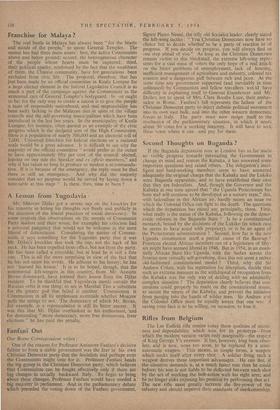Second Thoughts on Buganda ?
If the Buganda deputation now in London has so far made no visible progress towards persuading the Government to change its mind and restore the Kabaka, it has answered some important questions and raised others. The delegation's intel- ligent and hard-working members seem to have answered adequately the original charge that the Kabaka and the Lukiko were Buganda separatists, and to have established their case that they are federalists. And, though the Governor and the Kabaka at one time agreed that " the Uganda Protectorate has been and will continue to be developed as a unitary state," this, with federalism in the African air, hardly seems an issue on which the Colonial Office can fight to the death. The questions which the deputation has raised are, principally, three. First, what really is the status of the Kabaka, following on the demo- cratic reform's in the Buganda State ? Is he a constitutional monarch, bound by the decisions of the Lukiko (in which case he seems to have acted with propriety), or is he an agent of the Protectorate administration ? Second, how far is the new Uganda constitution itself a partial cause of the flare-up ? Fourteen elected AfriCan members out of a legislature of fifty- six might have seemed liberal in 1946. But in 1954, in an essen- tially African State like Uganda, with the Sudan across the frontier now virtually self-govetning, does this not seem a rather old-fashioned constitutional model ? Third, why did Sir Andrew Cohen, with his reputation for liberalism, decide that such an extreme measure as the withdrawal of recognition from the Kabaka was the only way of dealing with an admittedly complex situation ? The deputation clearly believes that con- cessions could properly be made on the constitutional issues, to secure the return of the Kabaka, and prevent the initiative from passing into the hands of wilder men. Sir Andrew ald the Colonial Office must be equally aware that one wa)


































 Previous page
Previous page